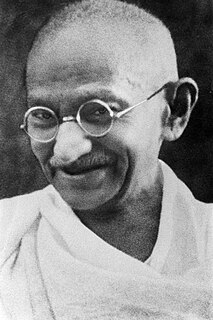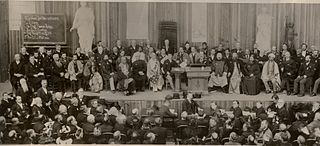Related Research Articles

Ahimsa, less commonly spelled ahinsa, is an ancient Indian principle of nonviolence which applies to all living beings. It is a key virtue in the Dhārmic religions: Jainism, Buddhism, and Hinduism.

Mohandas Karamchand Gandhi, also known as Gandhi, was an Indian lawyer, anti-colonial nationalist and political ethicist who employed nonviolent resistance to lead the successful campaign for India's independence from British rule, and to later inspire movements for civil rights and freedom across the world. The honorific Mahātmā, first applied to him in 1914 in South Africa, is now used throughout the world.

Pacifism is the opposition or resistance to war, militarism or violence. The word pacifism was coined by the French peace campaigner Émile Arnaud and adopted by other peace activists at the tenth Universal Peace Congress in Glasgow in 1901. A related term is ahimsa, which is a core philosophy in Indian Religions such as Hinduism, Buddhism, and Jainism. While modern connotations are recent, having been explicated since the 19th century, ancient references abound.

World peace, or peace on Earth, is the concept of an ideal state of happiness, freedom, and peace within and among all people and nations on Planet Earth. Within this idea of the world, nonviolence is one motivation for people and nations to willingly cooperate, either voluntarily or by virtue of a system of governance that has this objective. Different cultures, religions, philosophies, and organizations have varying concepts on how such a state would come about.

Nonviolence is the personal practice of not causing harm to others under any condition. It may come from the belief that hurting people, animals and/or the environment is unnecessary to achieve an outcome and it may refer to a general philosophy of abstention from violence. It may be based on moral, religious or spiritual principles, but also the reasons for it may be purely strategic or pragmatic.

Interfaith dialogue refers to cooperative, constructive, and positive interaction between people of different religious traditions and/or spiritual or humanistic beliefs, at both the individual and institutional levels. It is distinct from syncretism or alternative religion, in that dialogue often involves promoting understanding between different religions or beliefs to increase acceptance of others, rather than to synthesize new beliefs.
The Earth Charter is an international declaration of fundamental values and principles considered useful by its supporters for building a just, sustainable, and peaceful global society in the 21st century. Created by a global consultation process, and endorsed by organizations representing millions of people, the Charter "seeks to inspire in all peoples a sense of global interdependence and shared responsibility for the well-being of the human family, the greater community of life, and future generations." It calls upon humanity to help create a global partnership at a critical juncture in history. The Earth Charter's ethical vision proposes that environmental protection, human rights, equitable human development, and peace are interdependent and indivisible. The Charter attempts to provide a new framework for thinking about and addressing these issues. The Earth Charter Initiative organization exists to promote the Charter.
The World Movement for Nonviolence was founded in 1998 by Bawa Jain, follower of Acharya Sushil Kumarji Maharaj, began presenting the Gandhi-King Award in 1999. The organization has forged partnerships and alliances in over 60 countries and also hosts special programs at the UN.

There have been several meetings referred to as a Parliament of the World's Religions, the first being the World's Parliament of Religions of 1893, which was an attempt to create a global dialogue of faiths. The event was celebrated by another conference on its centenary in 1993. This led to a new series of conferences under the official title Parliament of the World's Religions with the same goal of trying to create a global dialogue of faiths.

Sulak Sivaraksa is a Thai social activist, professor, writer and the founder and director of the Thai NGO "Sathirakoses-Nagapradeepa Foundation", named after two authorities on Thai culture, Sathirakoses and Nagapradeepa. He initiated a number of social, humanitarian, ecological and spiritual movements and organizations in Thailand, such as the College SEM.
Quaker Peace & Social Witness (QPSW), previously known as the Friends Service Council, and then as Quaker Peace and Service, is one of the central committees of Britain Yearly Meeting of the Religious Society of Friends - the national organisation of Quakers in Britain. It works to promote British Quakers' testimonies of equality, justice, peace, simplicity and truth. It works alongside both small local and large international pressure groups.

Rajinder Singh is the head of the international non-profit organization Science of Spirituality (SOS), known in India as the Sawan Kirpal Ruhani Mission. To his disciples he is known as Sant Rajinder Singh Ji Maharaj. Singh is internationally recognized for his work toward promoting inner and outer peace through spirituality and meditation on the inner Light and Sound.
Religion and environmentalism is an emerging interdisciplinary subfield in the academic disciplines of religious studies, religious ethics, the sociology of religion, and theology amongst others, with environmentalism and ecological principles as a primary focus.
Glenn Smiley was a white civil rights consultant and leader. He closely studied the doctrine of Mahatma Gandhi and became convinced that racism and segregation were most likely to be overcome without the use of violence, and began studying and teaching peaceful tactics. As an employee of the Fellowship of Reconciliation (FOR), he visited Martin Luther King Jr. in Montgomery, Alabama in 1956 during the Montgomery bus boycott where Smiley advised King and his associates on nonviolent tactics, and was able to convince King that nonviolence was a feasible solution to racial tension. Smiley, together with Bayard Rustin and others, helped convince King and his associates that complete nonviolence and nonviolent direct action were the most effective methods and tools to use during protest. After the Civil Rights Movement, Smiley continued to employ nonviolence and worked for several organizations promoting peace in South American countries. Just three years before his 1993 death, Smiley opened the King Center in Los Angeles.

Religion and peacebuilding refer to the study of religion's role in the development of peace.

Mahavira: The Hero of Nonviolence is an illustrated children's story based upon the life of Mahavira, a teacher of the Jain faith.
Civility comes from the word civis, which in Latin means "citizen". Merriam Webster defines civility as civilized conduct or a polite act or expression. Historically, civility also meant training in the humanities.
The InterFaith Leadership Council of Metropolitan Detroit is a faith-based civic organization founded in 2010 by members of a Detroit-based interfaith group known then as the Interfaith Partners. Its headquarters are in Oak Park, Michigan.

The Millennium Peace Summit of Religious and Spiritual Leaders was held in New York City between August 28–31, 2000. The meeting recognized the importance of religion to world peace and faith leaders’ commitment to peacekeeping, poverty relief, and environmental conservation. It preceded the Millennium Summit, which commemorated the 50th anniversary of the United Nations (UN).
Sudarshan Kapoor is a professor emeritus, California State University at Fresno, where he taught during several decades. In 1992 Beacon Press published his Raising Up a Prophet. The African-American encounter with Gandhi. Kapoor is an advocate of non-violence, and an activist practicing Gandhi's philosophy at both the local and national levels. A supporter of the African-American struggle for justice, he also serves as a resource on its story.
References
- ↑ Hutter, Manfred (2013). Between Mumbai and Manila. V&R unipress GmbH. p. 226. ISBN 9783847101581.
- 1 2 Biography, Bawa Jain , retrieved 2015-03-25
- ↑ Niebuhr, Gustav (August 26, 2000). "Join In, He Asked Religious Leaders, and 2,000 Will". The New York Times . Retrieved 25 April 2015.
- ↑ "World Council of Religious Leaders". Berkley Center for Religion, Peace & World Affairs at Georgetown University. Archived from the original on 19 October 2015. Retrieved 25 April 2015.
- ↑ The World Council of Religious Leaders, Millennium Peace Summit , retrieved 2015-03-25
- ↑ "The World Council of Religious Leaders". www.millenniumpeacesummit.org. Retrieved 2021-06-02.
- ↑ "The World Council of Religious Leaders". www.millenniumpeacesummit.org. Retrieved 2021-06-02.
- ↑ "The World Council of Religious Leaders". www.millenniumpeacesummit.org. Retrieved 2021-06-02.
- ↑ "The World Council of Religious Leaders". www.millenniumpeacesummit.org. Retrieved 2022-02-14.
- ↑ "Gandhi–King Award", Wikipedia, 2020-08-31, retrieved 2021-12-22
- 1 2 Values Caucus at the United Nations. (2020). About Us. Values Caucus at the United Nations, Retrieved on November 26, 2021 from https://valuescaucus.org/about-us/
- ↑ "Summary report 16–28 January 1995". IISD Earth Negotiations Bulletin. Retrieved 2021-12-22.
- ↑ "Bawa Jain". Peace and Conflict Resolution Conference. Retrieved 2022-03-22.
- ↑ "Bridging Faith and Science to Combat the Overdose Crisis - May 4 event recap | Johns Hopkins Bloomberg School of Public Health". publichealth.jhu.edu. Retrieved 2022-03-22.
- ↑ ^ Meet the Speakers — TEDxUSF 2021, Bawa Jain: Restoring Civility To Public Discourse | TED Talk